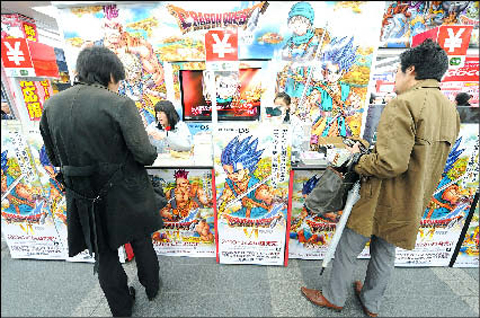Nintendo’s president shrugged off the just unveiled iPad tablet computer from Apple as delivering “no surprises” and displayed as little enthusiasm for 3D technology and high-definition upgrades for games.
Apple says the iPad is a new kind of mobile device that is more intimate than a laptop but is packed with more functions than a mobile phone.
“It was a bigger iPod Touch,” Satoru Iwata said of the much anticipated device shown on Wednesday by Apple Inc chief executive officer Steve Jobs.

PHOTO: EPA
Iwata denied speculation in Japanese media that what Nintendo Co has in the works in new gadgets may be a DS equipped with a motion-sensor similar to the wand for Nintendo’s hit Wii home console, or a Wii upgraded for high-definition TVs.
“I question whether those features would be enough to get people to buy new machines,” he said of the DS.
Nintendo engineers are developing new machines, he said, without giving details.
Iwata also doesn’t expect 3D video-gaming to catch on, although he welcomed 3D movies at theaters like James Cameron’s hit Avatar.
“I have doubts whether people will be wearing glasses to play games at home. How is that going to look to other people?” he said at a Tokyo hotel.
Separately, Japanese electronics group Fujitsu insisted on Friday it had been selling “iPad” mobile devices for years, spawning speculation over a possible trademark spat with Apple.
Fujitsu Ltd said its US subsidiary launched a sleek multimedia device, which allows retail store clerks to keep inventory data and manage other business operations, in 2002.
The US unit made a trademark application for the name “iPad” with the US Patent and Trademark Office in March 2003, Fujitsu spokesman Masao Sakamoto said in Tokyo.
The application is still pending and has not been registered, he said.
“As we are now sorting out the facts, we have not decided on what action we may take at the moment,” he said.

FREEDOM OF NAVIGATION: The UK would continue to reinforce ties with Taiwan ‘in a wide range of areas’ as a part of a ‘strong unofficial relationship,’ a paper said The UK plans to conduct more freedom of navigation operations in the Taiwan Strait and the South China Sea, British Secretary of State for Foreign, Commonwealth and Development Affairs David Lammy told the British House of Commons on Tuesday. British Member of Parliament Desmond Swayne said that the Royal Navy’s HMS Spey had passed through the Taiwan Strait “in pursuit of vital international freedom of navigation in the South China Sea.” Swayne asked Lammy whether he agreed that it was “proper and lawful” to do so, and if the UK would continue to carry out similar operations. Lammy replied “yes” to both questions. The

SECOND SPEECH: All political parties should work together to defend democracy, protect Taiwan and resist the CCP, despite their differences, the president said President William Lai (賴清德) yesterday discussed how pro-Taiwan and pro-Republic of China (ROC) groups can agree to maintain solidarity on the issue of protecting Taiwan and resisting the Chinese Communist Party (CCP). The talk, delivered last night at Taoyuan’s Hakka Youth Association, was the second in a series of 10 that Lai is scheduled to give across Taiwan. Citing Taiwanese democracy pioneer Chiang Wei-shui’s (蔣渭水) slogan that solidarity brings strength, Lai said it was a call for political parties to find consensus amid disagreements on behalf of bettering the nation. All political parties should work together to defend democracy, protect Taiwan and resist

By refusing to agree spending increases to appease US President Donald Trump, Spanish Prime Minister Pedro Sanchez threatened to derail a summit that NATO Secretary-General Mark Rutte needs to run smoothly for the sake of the military alliance’s future survival. Ahead of yesterday’s gathering in The Hague, Netherlands, things were going off the rails. European officials have expressed irritation at the spoiler role that Sanchez is playing when their No. 1 task is to line up behind a pledge to raise defense spending to 5 percent of GDP. Rutte needed to keep Spain in line while preventing others such as Slovakia

SHIFT PRIORITIES: The US should first help Taiwan respond to actions China is already taking, instead of focusing too heavily on deterring a large-scale invasion, an expert said US Air Force leaders on Thursday voiced concerns about the Chinese People’s Liberation Army’s (PLA) missile capabilities and its development of a “kill web,” and said that the US Department of Defense’s budget request for next year prioritizes bolstering defenses in the Indo-Pacific region due to the increasing threat posed by China. US experts said that a full-scale Chinese invasion of Taiwan is risky and unlikely, with Beijing more likely to pursue coercive tactics such as political warfare or blockades to achieve its goals. Senior air force and US Space Force leaders, including US Secretary of the Air Force Troy Meink and